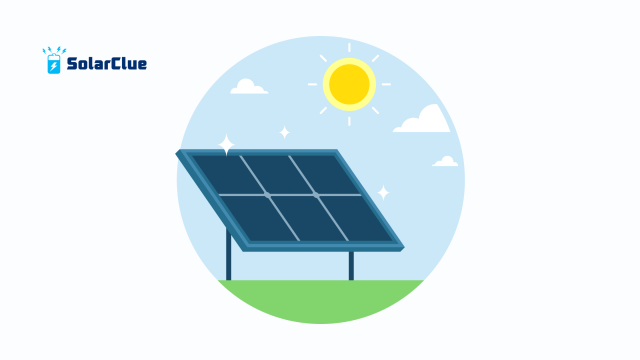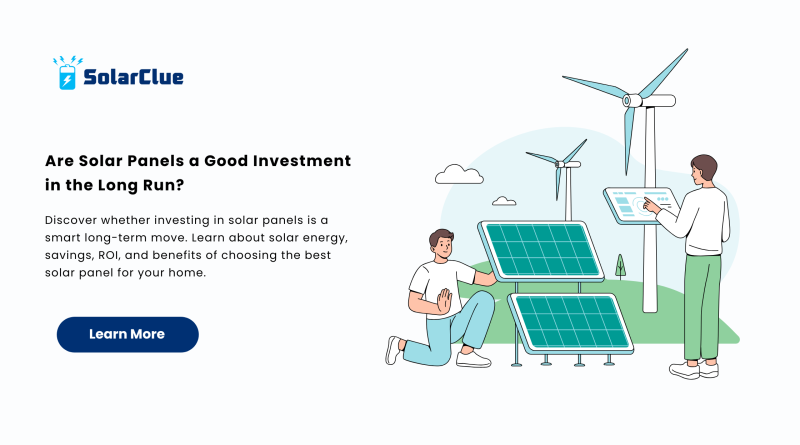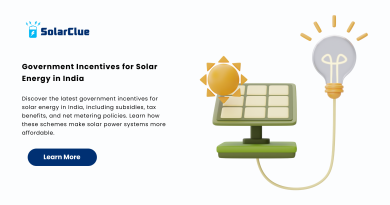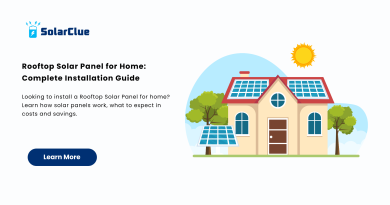Are Solar Panels a Good Investment in the Long Run?
In an age where electricity bills are constantly rising and environmental concerns are more pressing than ever, many homeowners are asking: Are solar panels a good investment in the long run? The short answer is yes. But let’s explore the why, how, and what you gain by installing a solar panel for home use.
Table of Contents
- 1 Understanding the Basics of Solar Investment
- 2 Long-Term Financial Savings
- 3 Environmental Benefits
- 4 Government Subsidies and Incentives
- 5 Technological Advancements
- 6 Low Maintenance and High Durability
- 7 Energy Independence and Grid Security
- 8 Challenges to Consider
- 9 Choosing the Right Solar Panel
- 10 Real-Life Scenario: Solar in Indian Homes
- 11 Solar Is the Future
- 12 FAQs
- 13 Conclusion
Understanding the Basics of Solar Investment
A solar panel captures sunlight and converts it into electricity using photovoltaic cells. This clean solar energy can power homes, businesses, and even entire communities. With advances in technology and falling costs, investing in a solar power system has become more accessible than ever before.
Long-Term Financial Savings
Reduced Electricity Bills
One of the most compelling reasons to invest in solar panels is the substantial reduction in electricity bills. Once you’ve installed a solar panel for home, your dependency on grid power decreases significantly. This means lower monthly bills and more savings over time.
Impressive Return on Investment (ROI)
The average solar power system pays for itself within 5 to 7 years through energy savings. After that, you’re essentially generating free electricity for the rest of the system’s lifespan, which can exceed 25 years when you use the best solar panel brands.
Increase in Property Value
Homes equipped with solar panels often see a rise in property value. Many buyers today are seeking eco-friendly homes, and a house powered by solar energy can be a major selling point.
Environmental Benefits
Beyond savings, solar energy offers a sustainable and environmentally friendly solution. Traditional electricity production relies heavily on fossil fuels, contributing to air pollution and greenhouse gas emissions. A solar power system helps reduce your carbon footprint and supports the global push toward renewable energy.
Government Subsidies and Incentives
To promote clean energy adoption, both central and state governments in India offer subsidies and tax benefits for installing solar panel systems. These can significantly lower your initial investment cost, making it an even better long-term deal.
Technological Advancements
Thanks to ongoing innovation, today’s best solar panels are more efficient, durable, and affordable than ever. You can even install smart solar power systems that track sunlight, adjust angles automatically, and send performance data to your phone in real-time. This helps in maximizing energy output and savings.
Low Maintenance and High Durability
Solar panels require minimal maintenance. Occasional cleaning and periodic inspections are usually enough to ensure optimal performance. Most manufacturers offer warranties of 20-25 years, guaranteeing peace of mind and sustained savings.
Energy Independence and Grid Security
By installing a solar panel for home, you reduce dependence on grid power. During peak summer months or grid failures, your solar power system ensures that you have access to uninterrupted electricity, especially if paired with a solar battery.
Challenges to Consider
While the long-term benefits are clear, it’s important to be aware of initial costs and installation challenges. The upfront investment for a solar energy system can be high, but financing options, EMIs, and government subsidies help ease the burden. Also, rooftop orientation, shading, and space must be assessed before installation to ensure the system’s effectiveness.
Choosing the Right Solar Panel
Not all solar panels are created equal. Research and choose the best solar panel that suits your location, energy needs, and budget. High-efficiency panels from reputed manufacturers might cost more initially but deliver higher returns in the long run.

Real-Life Scenario: Solar in Indian Homes
Take the example of a family in Bangalore who invested ₹1.5 lakh in a 3kW solar panel system. Their electricity bill dropped from ₹2,000 to ₹300 per month. In just 6 years, they covered their costs and have been enjoying free electricity since. Multiply that over 20+ years, and the savings are huge.
Solar Is the Future
More homeowners and businesses are realizing that solar panels are more than just an environmental move—they’re a smart financial decision. With the growing demand for sustainable energy, the value of your solar investment will only increase.
FAQs
Q1. How long do solar panels last?
Most solar panels come with a warranty of 25 years but can last even longer with proper maintenance.
Q2. Do solar panels work during cloudy or rainy days?
Yes, although solar energy production reduces, panels still generate power from diffused sunlight.
Q3. Is it worth investing in a solar panel for a small home?
Absolutely. Even smaller systems help cut down electricity costs and offer long-term financial and environmental benefits.
Q4. How much money can I save with solar panels?
Depending on your electricity consumption and system size, you can save between ₹1,000 to ₹5,000 or more every month.
Q5. What happens if my solar panel generates more power than I use?
Through net metering, excess energy is sent back to the grid, and you receive credits on your electricity bill.
Conclusion
So, are solar panels a good investment in the long run? Yes—they save money, increase property value, offer energy security, and contribute to a greener planet. With the right guidance and quality installation, your solar panel for home can be one of the wisest investments you make for your future.
Looking to start your solar journey? Discover the best options at solarclue.com or read more insights at blog.solarclue.com—because your future deserves clean and smart energy.



